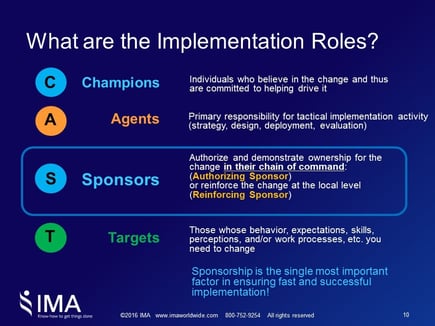What's the difference between a Change Agent and a Change Champion? The AIM Change Management Methodology describes the roles like this in our CAST of Characters (Champions, Agents, Sponsors, and Targets):

Champions believe in and want the change and attempt to obtain commitment and resources for it but may lack the sponsorship to drive it. Implementation can be accelerated when the other three roles (Agents, Sponsors, and Targets) are also Champions.
Agents implement change. Agents have implementation responsibility through planning and executing implementation. At least part, if not all of change agent performance is evaluated and reinforced on the success of this implementation.
So, while it is great to build a critical mass of Change Champions, these individuals don't have accountability for actually getting the change implemented. The AIM Change Management Methodology lays out some key principles regarding Change Agents and Change Champions:
- Everyone is a Target first. This includes Champions, Agents, Sponsors and Targets
- Change Agents must have trust and credibility with the Sponsors and trust and credibility with the Targets
- In major change, there will always be overlap in the roles. When roles overlap, treat the individual as a Target first
Criteria for Successful Change Agents
Given the importance of the Change Agent role, it's critically important to build a network of local Change Agents with skills and characteristics we need. As you review the potential individuals for your own Change Agent network, consider whether the individual meets these criteria:
- Successful personal and organizational history
- Success and credibility with key Sponsors

- Trust with key Targets
- Awareness of culture and sub culture differences
- Belief in the project
- Knowledge of the business unit and strategy
- Ability to translate the Sponsors' Frame of Reference (FOR) to the Targets' and vice versa, without their own FOR interfering
- Ability to develop teamwork among Sponsors, Change Agents, and Targets by creating common goals and inter dependence for success
- Comfort level with ambiguity
- Courage. Why courage? Because the Change Agent must be willing to ask Sponsors for what they need, even when it becomes difficult or uncomfortable
Remember that building the cascade of Sponsors at each level who each demonstrate commitment by what they Express, Model, and Reinforce is the single most important factor in getting swift implementation and value realization for your change.
Project teams should recognize early on the importance of building this network of Change Agents and ensure these individuals have the skills and knowledge to be successful in this important role. After all, it's not the Change Champions that will have implementation responsibilities-- it's the Change Agents.
What's your project team doing to help to identify the right individuals and then "skill up" these folks through training and coaching? Do these individuals have a common change management methodology and implementation framework they can apply, rather than having to reinvent the wheel? Or are they having to learn by trial and error?
Common Change Agent Mistakes
This training is critically important if you are going to avoid some of the common Change Agent mistakes we have seen in our own change management consulting, including:
- Change Agents that assume their own change occurs in isolation and fail to understand they are competing for resources with all the other changes occurring at the same time. They may also fail to understand the success or failure of previous implementations and all the lessons learned about change in the organization will affect the current change as well.
- Change Agents who change more or less than the Sponsor asks or attempt to implement the change without Sponsorship.
- Change Agents who overestimate their own skill and capacity. They may also underestimate Target Resistance and overestimate Target Readiness.
- Change Agents who are seduced by activity. It's not about being really busy, it's about focusing on the right actions at the right time. That's why a change management methodology that is principle driven is so valuable. Change Agents can't be effective if they are simply guided by completing checklists and templates instead of being guided by principles that give directional guidance.
So, it's certainly important to have Champions who believe in your change. But belief and enthusiasm won't get the change implemented. Make certain you are building a strong network of Change Agents that will be accountable for implementing your change at each area and level affected.


